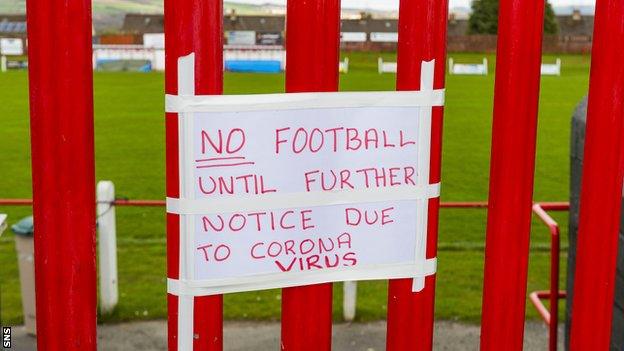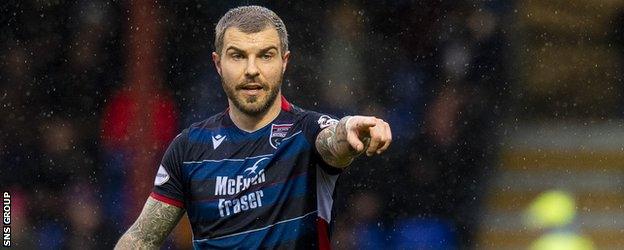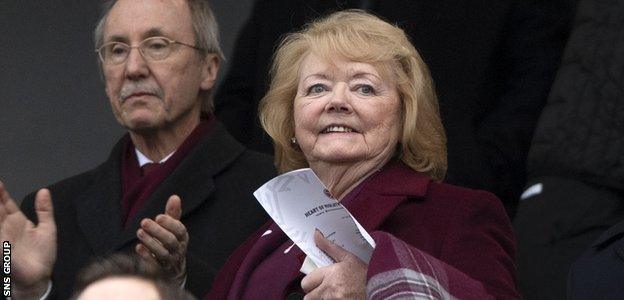What are the unresolved issues in Scottish football?
- Published

All football in Scotland has been suspended since 13 March
The Premiership has been called and last week's EGM already feels like it happened months ago, but a myriad of unresolved issues remain unresolved in Scottish football.
From players contracts and league reconstruction to legal challenges and financial issues, BBC Scotland tries to outline what will likely be the next major talking points.
What is happening with players' contracts?
Amid the furore, this issue has been quietly simmering in the background. Around 90 players in the top flight alone are out of contract in the next month. Ross County's Richard Foster is one of them and described the situation as like being "in no man's land".
New deals for most players seems impossible given the lack of income for clubs for the foreseeable future. And, despite the extension of the UK government's job retention scheme until October, there is a regulatory as well as a PR issue for clubs extending contracts of those on furlough, given the wages will be covered mostly by the taxpayer.
PFA Scotland, the players' union, has written to clubs to say fixed-term contracts can be extended in line with the furlough scheme, and has urged them to do so.
"It's really down to the clubs," said chief executive Fraser Wishart. "There's no obligation on them but many of the clubs are going to try and do that."

Foster is one of around 90 top-flight players out contract in the coming weeks
Players leaving clubs might bring some financial relief but it is the footballers, most of whom do not earn millions of pounds, who then feel the brunt of the crisis.
The hotly debated 'Clause 12' in all SPFL contracts might also come into play if the suspension of the game continues beyond 10 June. Clubs argue it gives them the right to freeze salaries while football is on hold.
Clause 12 in players contracts in Scotland states: "In the event of the Scottish FA deciding that the game shall be suspended, either entirely or in any district or districts as provided for in the articles of association of the Scottish FA, this agreement shall be correspondingly suspended, unless the club is exempted from such suspension or the club otherwise determines."
What will happen to the new season?
The majority of clubs who voted to end the season in the Championship and Leagues One and Two did so to get some clarity so they can plan and move forward for the next term.
The issue, one month on, is that there is no certainty the new league campaign will start as planned on 1 August. SPFL chairman Murdoch MacLennan said last week Scottish football "must do everything humanly possible" to return by the end of July, but is that even feasible?
The game in Scotland is suspended until at least 10 June, with the Scottish FA's chief medical consultant Dr John MacLean suggesting six weeks of training is needed before players can return to action. And national clinical director Professor Jason Leitch said on Saturday it is still "too early" to talk about a July return.
Then there's the issue of closed-door games, which many clubs can't afford, particularly given the onerous costs of Covid-19 tests. You can expect clubs to continually stress the need for a swift return in the hope government is listening because they don't really have any other choice.
What about league reconstruction?
Just a week after being shelved, plans to alter the league set-up are back on the table after discussions among Premiership clubs.
Hearts owner Ann Budge has been tasked with laying out plans for a temporary alteration, which would likely see her club, as well as Partick Thistle and Stranraer, spared relegation in rearranged leagues.
But will it succeed? Stenhousemuir chairman Iain McMenemy believes that's unlikely, given what he says is a divide on whether a change should be temporary or permanent.
If talks break down again, the possibility of legal challenges from relegated clubs, including Hearts, remains.
Then there is Rangers, who did not rule out taking their issues with the SPFL further after pushing for an independent inquiry into the vote to end the season.
The big barrier to legal cases? Cost.

Budge has been tasked with finding a temporary solution to league reconstruction
Will the league get a sponsor?
Amid the Scottish football storm, it's gone almost unnoticed that the top four leagues and the Scottish Cup are without a title sponsor for next season.
The deal with bookmakers Ladbrokes to sponsor the Premiership, Championship, League One and League Two has come to an end, with William Hill no longer putting their name to Scotland's major cup competition.
Clubs are more desperate for money now more than ever before, but it is an unenviable task to persuade other businesses to part with cash in the current climate.
Will clubs survive?
It's the question that is asked repeatedly, with many - including former Aberdeen chief executive Keith Wyness - forecasting the worst case scenario for some of Scotland's clubs.
"I do think there is going to have to be a complete recalibration, looking to one or two leagues maximum," Wyness said, but is he right?
Stranraer, set for League Two, and Dumbarton in the tier above, will have no players under contract from the start of next month, which will help them get through the challenging period without football by cutting outgoings.
Smaller clubs also rely heavily on volunteers rather than paid staff, which should help. But those with lots of players on contracts beyond the end of May - Hearts and Aberdeen being prime examples - will be tied in to paying wages with little income for the foreseeable future.
Again, the government's furlough scheme helps to ease the strain here for those who choose to use it, but if football was to resume behind closed doors or players were to return to training, clubs' eligibility for state support ends.
Then there is the small matter of the new broadcasting deal with Sky Sports, which is due to start next season. If the new campaign was to start late, or behind closed doors, would that affect the deal? Premier League clubs in England have been told they may have to repay £340m to broadcasters if matches do not take place as anticipated.
There is also the £10m that can allegedly be claimed back by sponsors and broadcasters if the Premiership is called, which Rangers raised in a dossier in support of their resolution for an independent inquiry.
The fact is without fans coming in to grounds, or at least paying to watch football remotely, clubs face a bleak future.